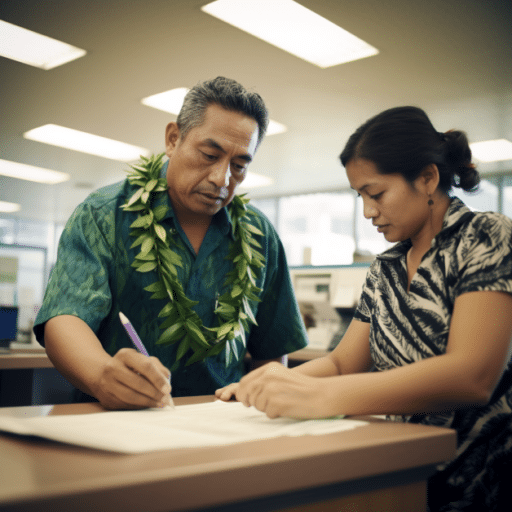A trust account in the Cook Islands offers numerous benefits for investors worldwide. The Cook Islands, located in the South Pacific, have carved out a niche in the global finance arena as a premier jurisdiction for asset protection trusts. When you set up a trust account in the Cook Islands, you leverage the robust Cook Islands’ trust law designed to protect the settlor’s assets.
If you want to invest as an expat or high-net-worth individual, you can email me (advice@adamfayed.com) or use these contact options.
Determining the Type of Trust Account
As the first step in setting up a trust account in the Cook Islands, you need to understand and choose the type of trust that best aligns with your financial goals and circumstances. You have two main options: the revocable trust and the irrevocable trust. Your decision at this stage will significantly impact the operation and benefits of your trust account in the Cook Islands.
The Revocable Trust
A revocable trust, also known as a living trust, offers flexibility, allowing the settlor (the person who creates the trust) to change the terms of the trust or even dissolve it entirely during their lifetime. This flexibility can be a significant advantage for those whose financial or personal circumstances may change over time.
One point to note, however, is that while setting up a revocable trust account in the Cook Islands gives you control and adaptability, it may not provide the same level of asset protection or estate planning benefits as its irrevocable counterpart. This is so that creditors can access assets in a revocable trust, which are still a part of the settlor’s estate.

The Irrevocable Trust
The irrevocable trust is a more rigid structure. Once you set up an irrevocable trust account in the Cook Islands, the terms cannot be easily changed, nor can the trust be terminated without the beneficiaries’ consent.
Though the thought of such permanence might seem daunting, this rigidity is the primary reason why many choose to set up an irrevocable trust account in the Cook Islands. Why, you may ask? It’s simple: asset protection. Once you place assets in an irrevocable trust, they no longer form part of your estate. This structure shields them from potential future creditors, lawsuits, and estate taxes.
Moreover, the Cook Islands trust law offers additional layers of protection for an irrevocable trust account. For instance, the Fraudulent Disposition Act of 1989 provides a short two-year window during which creditors can challenge the transfer of assets into the trust. After this period, the assets are safe from any claims.
Making the Choice
So, which trust should you choose when setting up a trust account in the Cook Islands? The answer lies in your unique needs, circumstances, and long-term objectives.
If you need flexibility and control and are less concerned about asset protection, a revocable trust may be the right choice. However, if asset protection and estate planning are your primary goals, an irrevocable trust account in the Cook Islands is a highly effective tool to consider.
Key Roles in a Trust
Understanding the roles in a trust is crucial when establishing a trust account in the Cook Islands. The key roles include the settlor, trustee, protector, and beneficiary.
Each role comes with its own set of responsibilities and legal obligations, and understanding these can help in the effective management and operation of the trust.
The Settlor
The settlor plays a crucial role when setting up a trust account in the Cook Islands. The settlor, also known as the grantor or trustor, is the individual or entity that establishes the trust. In the creation of the trust, the settlor transfers their assets to the trust account, effectively relinquishing their control over these assets. This is a deliberate act to safeguard assets from potential claims and disputes.
The Trustee
The trustee is the person or entity appointed to manage and administer the trust account in the Cook Islands. This role comes with significant responsibility, as the trustee must act in the best interests of the beneficiaries, prioritizing their needs and welfare over their own. It is the trustee who decides how the trust’s assets are invested and distributed according to the guidelines set out in the trust deed. Trustees have a legal obligation to fulfill their role with honesty and integrity.

The Protector
The protector is an additional layer of security for a trust account in the Cook Islands. While not always present, the protector serves to oversee the trustee’s actions. This role was introduced to ensure that the terms of the trust are upheld, and the interests of the beneficiaries are protected. The protector has the authority to intervene if they believe the trustee is not acting in the best interests of the beneficiaries. In some cases, the protector might also have the power to appoint or dismiss trustees.
The Beneficiaries
Finally, the beneficiaries are the individuals or entities that stand to benefit from the trust account in the Cook Islands. The settlor designates the beneficiaries when they establish the trust, and they can be anyone from family members to charities. The trustee manages the assets in the trust account on behalf of these beneficiaries. The trustee must make decisions that align with the beneficiaries’ best interests, which is at the heart of their fiduciary duty.
Selecting a Trustee and a Protector
For your trust account in the Cook Islands to run smoothly, you must carefully choose your trustee and protector. They play crucial roles in the successful operation and management of your trust.
The Role of a Trustee
A trustee is paramount in establishing a trust account in the Cook Islands. A trustee is a person or organization that you designate to hold, manage, and distribute the assets of the trust account based on the provisions detailed in the trust deed. The trustee has a fiduciary duty, which means they are legally obligated to act in the best interest of the trust beneficiaries. Therefore, the trustee of your trust account in the Cook Islands must demonstrate exceptional reliability and expertise in managing trust assets.
Selecting the Right Trustee
When selecting a trustee for your trust account in the Cook Islands, it’s crucial to consider several factors. Primarily, the trustee must possess a thorough knowledge of the Cook Islands’ trust laws to ensure they can navigate the legal landscape effectively.
Additionally, they should have proven experience in managing trusts or similar financial assets. The trustee’s integrity is also vital, and they must show a commitment to act in the best interests of the trust beneficiaries, managing the trust account with diligence and prudence.
The Role of a Protector
Alongside the trustee, another crucial role in the administration of your trust account in the Cook Islands is that of the protector. The protector operates as a form of oversight for the trust, ensuring that the trustee acts by the trust terms and in the best interest of the beneficiaries.

Choosing an Appropriate Protector
Choosing a protector for your trust account in the Cook Islands is as crucial as selecting a trustee. Like the trustee, the protector should also understand the Cook Islands trust laws well. However, their role is more supervisory.
Therefore, the protector should be able to evaluate the trustee’s actions impartially and step in when necessary. This role often requires someone with a keen eye for detail, a strong sense of fairness, and the courage to take decisive action when the trustee is not adhering to the trust’s best interests.
The Interplay Between Trustee and Protector
The trustee’s and protector’s roles in your trust account in the Cook Islands are not mutually exclusive but rather complementary. The trustee carries out the day-to-day operations of the trust. At the same time, the protector provides an added layer of protection for the beneficiaries, ensuring that the trustee is abiding by the trust’s terms and acting in the best interests of the beneficiaries. This dynamic interplay between the trustee and protector serves to maintain the integrity and effectiveness of your trust account in the Cook Islands.
Designing the Trust Deed
When setting up a trust account in the Cook Islands, a crucial step is the design of the trust deed. This legal document is central to establishing the trust, acting as a blueprint that provides instructions and guidance for the trustee. It outlines the trust’s terms, conditions, and provisions. The trust deed ensures all parties involved, including the settlor, trustee, and beneficiaries, are clear about their roles, obligations, and entitlements within the trust arrangement.
Key Components of a Trust Deed
Statement of Purpose
The trust deed must state the trust’s purpose clearly and explicitly. This defines what the trust is meant to achieve and how it will operate. It may be designed to protect assets, provide for beneficiaries, or support charitable endeavors. This purpose should align with the reasons for opening your trust account in the Cook Islands, whether it’s asset protection, estate planning, or other objectives.
Detailed List of Assets
The trust deed should contain a comprehensive list of the assets which the trust holds. This may include property, investments, cash, or other valuable items. This list must be thorough and accurate since it’s these assets that the trust account in the Cook Islands will hold and manage. It’s necessary to regularly update this list as assets may be added or removed from the trust over time.
Information About Beneficiaries
The trust beneficiaries, the individuals or entities who will benefit from the trust assets, must be specified in the trust deed. Information about beneficiaries can include names, contact details, and the terms under which they will benefit. This helps ensure that the trust account in the Cook Islands serves the interests of the beneficiaries as intended.
Provisions for Trustee and Protector
The trust deed should detail provisions for the trustee, the person or organization responsible for managing the trust account in the Cook Islands. These provisions include the trustee’s powers, duties, and restrictions. Similarly, if a protector is involved – a person appointed to oversee the trustee – the trust deed should detail their powers and duties as well.

Funding the Trust
Creating a trust account in the Cook Islands is just the first step in the process. After designing your trust deed, it becomes crucial to fund this trust account effectively. This funding involves a transfer of your assets into the trust account in the Cook Islands. It’s an important phase because the funding transforms an otherwise empty trust into a powerful asset-protection tool.
Types of Assets for Funding
The Cook Islands offer flexibility when it comes to the kind of assets you can transfer into your trust account. You can fund your trust account in the Cook Islands with a broad range of assets, including:
- Cash
- Real estate
- Stocks
- Other valuable properties
It’s not limited to these, and a wide array of other tangible and intangible assets can also be transferred into the trust account in the Cook Islands.
Properly Titling and Transferring Assets
When you are funding your trust account in the Cook Islands, it’s essential to ensure that you properly title and transfer these assets. This procedure is crucial to ensuring that the assets are legally held within the trust and are therefore protected under Cook Islands trust law.
What Does Proper Titling Mean?
Proper titling implies that the ownership of the asset is in the name of the trust, not your personal name. For instance, if you’re transferring a piece of real estate to your trust account in the Cook Islands, the deed to that property should be re-registered in the name of the trust.
How to Transfer Assets
Transferring assets to your trust account in the Cook Islands varies depending on the type of asset. You must instruct your bank or brokerage to transfer cash and securities into the trust’s account. The title deed must be legally transferred to the trust for tangible assets like real estate.
Remember, working with experienced professionals during this phase is imperative to avoid any legal complications. Trust law and asset transfers can be complex areas, so it’s crucial to get this right to ensure the effective operation of your trust account in the Cook Islands.
The Role of Due Diligence
When funding a trust account in the Cook Islands, due diligence plays an important role. As a trust settlor, you should ensure the legitimacy of the assets being transferred into the trust. This process involves a comprehensive review of the origin and legality of the assets to prevent the inclusion of illegally obtained assets.
Registering the Trust
With the trust deed designed and the trust funded, you can now register your trust account in the Cook Islands. To register your trust account in the Cook Islands, the necessary documentation must be prepared and submitted.
Executed Trust Deed
The trust deed should be properly executed according to the rules outlined by the Cook Islands trust laws. This deed serves as the governing document for the trust and is required to establish your trust account in the Cook Islands.
Proof of Asset Transfer
Providing evidence of asset transfers is crucial in the registration process. Detailed documentation showing that assets have been legally and effectively transferred into the trust is required. This proof solidifies the legitimacy of your trust account in the Cook Islands.
Due Diligence Documents
Due diligence is required to ensure compliance with global financial regulations and to uphold the reputation of the Cook Islands as a trust jurisdiction. The documents required typically include identity and address proofs, source of funds information, and documentation regarding the beneficiaries. These measures ensure the trust account in the Cook Islands is not used for illicit activities like money laundering or fraud.
Submitting the Documentation
Once the necessary documentation is prepared, it is submitted to your selected trustee in the Cook Islands. The trustee is a person or corporate entity licensed and regulated by the Cook Islands Financial Services Commission. The trustee’s role is to handle the registration process for your trust account in the Cook Islands. They will review the documents, ensure compliance with local and international laws, and ultimately register the trust.
Confidentiality in the Cook Islands
One of the major advantages of setting up a trust account in the Cook Islands is the degree of confidentiality offered. The Cook Islands does not have a public register of trusts, which means the details of the settlor, trustees, and beneficiaries are kept private. This confidentiality significantly attracts global investors to open a trust account in the Cook Islands.
Maintaining and Managing Your Trust Account
Setting up your trust account in the Cook Islands is just the beginning. Proper maintenance and management are crucial for your trust to continue operating effectively.

Conducting Regular Audits
To ensure that your trust account in the Cook Islands operates within the boundaries set by the trust deed and local law, conducting regular audits and reviews is crucial. These checks can identify potential issues in their infancy, avoiding future complications. It’s recommended to hire professionals well-versed in Cook Islands trust law to provide these audit services.
Regular audits are not just a good-to-have; they’re vital. They ensure that the trust account in the Cook Islands remains compliant, eliminating any risk of potential legal conflicts. They also protect the integrity of the trust and its assets, reassuring all stakeholders involved.
Updating the Trust Deed
Change is an inevitable part of life, and your trust deed should reflect these changes. Revising your trust deed is vital as your circumstances or desires change over time. For instance, you may want to add a new beneficiary, or perhaps the financial situation of your trust account in the Cook Islands has changed significantly. All these instances require prompt updates to the trust deed.
Prompt communication with your trustee is key in updating your trust deed. They should be made aware of any changes in your personal or financial circumstances that may affect your trust account in the Cook Islands.
Maintaining Communication with Trustee and Protector
Your trustee and protector play significant roles in managing your trust account in the Cook Islands. Thus, it’s crucial to maintain open, honest, and regular communication with them. They can provide you with valuable advice and ensure the smooth operation of your trust.
Open communication builds trust, which is the bedrock of any successful relationship, including the one with your trustee and protector. It also ensures that the trust account in the Cook Islands is managed effectively and efficiently, aligning with the trust’s original intent and goals.
Monitoring Beneficiary Distribution
Just as important as setting up the trust account in the Cook Islands is monitoring and properly documenting beneficiary distributions. These distributions should always be made according to the trust’s provisions and in the best interest of the beneficiaries.
Correct documentation of distributions maintains the integrity of the trust account in the Cook Islands and prevents potential disputes among beneficiaries. This documentation should be detailed, transparent, and readily available for review to maintain trust among all stakeholders.
Pained by financial indecision?

Adam is an internationally recognised author on financial matters with over 830million answer views on Quora, a widely sold book on Amazon, and a contributor on Forbes.



